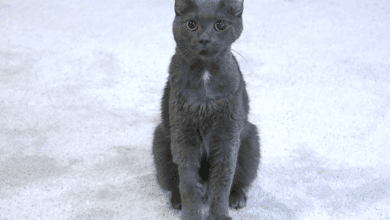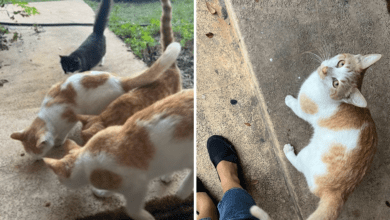Late Good News Arrives for FIP Cats in the US – News

Tawny before after
Photos by Wendy Novicoff
Tawny was diagnosed in 2020, at four months old, with a form of feline infectious peritonitis that affected her eyes (above). Her owner, Wendy Novicoff, quickly began treating her with an imported compound obtained through Facebook contacts. It was likely a version of GS-441524, an antiviral known to reverse the disease. After 12 weeks of treatment with the black market product, Tawny showed no signs of illness (bottom). Novicoff, professor of orthopedic surgery and public health sciences at the University of Virginia School of Medicine, has become an advocate for legal FIP medications.
A veterinary compounding pharmacy in New Jersey has announced that it will make an oral treatment for feline infectious peritonitis available starting in June. The pills for individual prescription patients will be the first veterinary FIP treatment sold in the United States.
“It’s a big, transformative day for us in the world of FIP therapy,” said Dr. Samantha Evans. An assistant professor of clinical pathology at Colorado State University’s College of Veterinary Medicine and Biomedical Sciences, Evans has been researching treatments for FIP since 2020.
FIP is a rare and devastating response in cats to infection with a common pathogen, feline enteric coronavirus (FECV). Most cats infected with FECV are asymptomatic and remain healthy. But occasionally, the virus mutates in such a way that it infects cells of the immune system, which spread and cause inflammation that is deadly without treatment.
The road to effective treatment has been long and frustrating. In the late 2010s, researchers at the University of California, Davis School of Veterinary Medicine discovered that an antiviral agent called GS-441524 reversed FIP. However, the patent holder, Gilead Sciences, never applied to the U.S. Food and Drug Administration for authorization to sell it.
Cat owners have obtained black market versions of GS-441524, in injectable and pill forms, to treat sick pets on their own. The unauthorized treatments were found to be effective. A survey of owners by Evans and colleagues, the results of which were published in 2021, found survival rates of 80% or better for cats using black market treatments.
A related antiviral drug, remdesivir, has also been found to work well against FIP. An injectable form of the drug was approved by the FDA in 2020 to treat Covid-19 in humans. Remdesivir can be prescribed for off-label veterinary use, but supplies are so limited that many cat owners continue to use GS-441524 on the black market.
In 2021, Bova, a veterinary pharmaceutical company based in the United Kingdom and Australia, began preparing GS-441524 for veterinarians. It now supplies the medicine in parts of Europe, Australia, Canada and other countries.
In the US, drug manufacturer Stokes Pharmacy states in its website advertisement that it has formed a relationship with Bova to offer the same drug for sale domestically.
A co-owner of Stokes Pharmacy assigned to speak about FIP treatment was unavailable this week. Bova referred all questions to Stokes.
A legal gray area
Because GS-441524 is not available as an FDA-approved drug, Stokes will likely compound it from bulk active pharmaceutical ingredients, a practice that falls into a complicated gray area in terms of the law.
Technically, veterinary compounding using bulk ingredients is illegal in the US. However, understanding that veterinary manipulation using bulk ingredients is sometimes medically appropriate, the FDA has produced guidelines that describe the circumstances under which it will exercise what it calls “enforcement discretion.”
The guidelines state, for example, that the F.D.A. “generally does not intend to take enforcement action” when there is no FDA-approved product with the same active ingredient.
Asked about Stokes’ announcement, FDA spokesperson Siobhan DeLancey said: “The FDA is aware of Stokes Pharmacy’s announcement that it will begin marketing a compounded version of GS-441524 and is still obtaining additional information.”
FIP researcher Evans, who is not affiliated with Stokes or Bova, predicts accelerations in the drug’s launch.
“There will possibly be some issues with supply because we know there will be huge demand at the beginning,” she said. “People are going to have to be patient with this a little bit.” FIP is estimated to affect about 1.3% of cats, most often kittens in catteries and shelters.
Furthermore, the tablet format does not work in all cases. While oral medications are great for patients who can eat, Evans said, “they’re not as good for animals that are sinking and falling onto the table.”
She added: “I’m trying to be realistic about it, but it’s still very emotional.”




